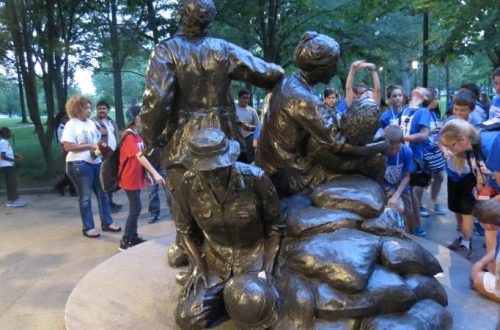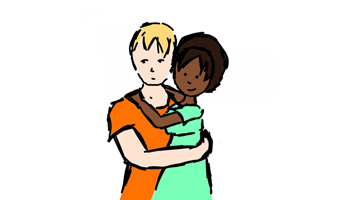The Transformation of a (Bible) Church Lady
The nut of any story of transformation is “I used to…but now…”
Evolving in Monkey Town is Rachel Held Evans' story of transformation. Daughter of a Dallas Theological Seminary grad, Rachel used to be a Bible Church going, Christian Character Award winning, youth group leading, Bryan College attending young woman quite certain of the answers to the hard questions about God. Christianity meant having the right opinions about God and being able to defend them at all costs. Her self-worth and sense of purpose were all wrapped up in “getting God right.” But now she describes herself as “moving through doubt to belief.” Belief held with open hands and a cognitive humility that “leaves room for God to surprise us every now and then.”
The nut of any story of transformation is “I used to…but now…”
Evolving in Monkey Town is Rachel Held Evans' story of transformation. Daughter of a Dallas Theological Seminary grad, Rachel used to be a Bible Church going, Christian Character Award winning, youth group leading, Bryan College attending young woman quite certain of the answers to the hard questions about God. Christianity meant having the right opinions about God and being able to defend them at all costs. Her self-worth and sense of purpose were all wrapped up in “getting God right.” But now she describes herself as “moving through doubt to belief.” Belief held with open hands and a cognitive humility that “leaves room for God to surprise us every now and then.”
In my previous blog I chronicled Rachel’s journey into doubt. How did God help her find her way to belief? Rachel loved Scripture and felt deep compassion for those separated from God by culture and race. The two seemed to be in opposition until she visited the poorest of the poor, the Dalit’s in India, and saw God’s redeeming work in their lives and culture and their joyful, grateful response. He also revealed his heart to her in the words of scholarly servants and in unexplored parts of the Bible.
Rachel used to rail at God over the Scriptures that seemed to substantiate what she denounced as “Pond Scum Theology.” The claim that human beings have no value or claim to salvation because their sin makes them so disgusting and offensive to God. The idea that the reprobate are created for hell without any hope of salvation. Her compassion for outsiders created great tension in her relationship with God. “I didn’t like this version of God in which his wrath overwhelms his mercy,” she emailed a friend, “in which he has less compassion for people than I do.” “Take it up with God,” the friend replied.
But now she delights in newly meaningful passages of the Bible like Revelation 7—the great picture of people from every nation, tribe people and language standing before God’s throne, singing his praise. “Never again will they hunger…thirst…For the Lamb…will be their shepherd; he will lead them to springs of living water. And God will wipe every tear from their eyes.” The scope and size of this large, inclusive vision of the redeemed and God’s value of the nations put the passages about God’s judgment into a larger, more compassionate context.
She used to believe that God’s determination of when and where people were born amounted to a “cosmic lottery.” Some find themselves born into times and places far from Christ, others much closer and more likely to hear the gospel. But now she embraces the truth of Acts 14:17, that God does not leave himself without a witness among them. And the bigger picture of Acts 17:26-27: God has created people so that they might “seek him and perhaps reach out for him and find him, though he is not far from each one of us.”
She used to believe that Isaiah 55 (“God’s ways are higher than our ways”) was another hammer stroke forcing her to deal with the justice of God’s wrath. But now, as she has studied the broader context of the chapter, she realizes that it provides “an entirely different framework for thinking about God’s justice…it suggests that we have it entirely backward—the mystery lies not in God’s unfathomable wrath, but in his unfathomable mercy. God’s ways are higher than our ways because his capacity to love is infinitely greater than ours…In the Sermon on the Mount Jesus said, ‘Love your enemies and do good…Be merciful just as your Father is merciful.’ We’ve got our ways of dealing with our enemies and God has his…Our way is to make someone pay with blood; his is to bleed.”
We may not have landed in exactly the same place, but Rachel and I have made a similar journey. My reckoning with God’s justice and mercy came when a dear friend’s son gunned down his wife’s ex-husband in broad daylight in a Sweet Tomatoes parking lot. Jason and his wife suspected his victim of abusing her little girls that he was now helping to raise and loved dearly.
It took two and a half years for Jason’s case to come to trial. For two and a half years I prayed with Carol for her son. Of course, in her mother’s heart, she was crying out for mercy for her son. She was devastated by the crime he had committed. All she could do was offer up her son on an altar of prayer and beg God for mercy.
I used to be like Rachel, certain of the cosmic application of God’s wrath and justice, but without her deep sense of compassion. As I wrestled with how to pray for Jason, my prayer became, “Lord, show her son your perfect balance of justice and mercy.”
As I prayed for God’s perfect “balance,” I struggled even more. My heart cried out, “Lord, where is that perfect balance between justice for a young man who has committed murder and mercy for one who desired to protect his broken family and mercy for my friend’s broken heart?” I ached for my friend.
There are many ways to lose a child, and Carol was walking through a loss loaded with humiliation. She travels and speaks a great deal, constantly meeting new people. “Oh, tell us about your family.” Suddenly that casual, sweet, get-to-know-you question became salt in an open wound.
Being the mother of an only child, also a son, I couldn’t imagine what it was like to have your son’s wife of one year and her two daughters home for the holidays, but not your son. I couldn’t imagine what it would be like to try to visit your son behind glass when you have to shout to be heard, squeezed between people on both sides also shouting at their loved ones.
In my prayers I traced the outlines of my pictures of God: On his throne, ruling in justice. And that justice satisfied by the merciful sacrifice of God the Son on the cross. Isn’t that a picture of the perfect balance of justice and mercy? That’s certainly what I’ve often thought.
At the same time I was praying, I was reading a book by John Piper that draws the most compelling portrait of our Savior, Seeing and Savoring Jesus Christ. And one day he spoke truth to my JUSTICE and mercy heart. Piper made the case that God’s justice is “essential,” but his mercy is “paramount.” He cited John 3:17: “God did not send the Son into the world to judge the world, but that the world might be saved through him.” “If justice can be preserved,” Piper wrote, “it is the apex of glory to show mercy.”
Romans 15:8-9 tells us that Christ came into the world “to confirm the promises given to the fathers and for the Gentiles to glorify God for his mercy.” Piper explained, “The substitutionary death of Christ created the backdrop of justice where justifying mercy would shine with unparalleled glory” (emphasis mine).
I used to picture God as this perfect balance of justice and mercy. But now I realize it’s not true. At the cross God tips the needle way over to the mercy side.
This was one of those “Aha!” moments in life when the light of “the Lord our God is merciful and forgiving” broke through the clouds of my mercy-challenged background. I believe the cross is the very best example of Rachel’s need to see and embrace a God whose mercy trumps his justice. Exactly how that justice works out in saving outsiders…like Rachel, I’m not as cock sure as I used to be either. To see Jesus and reject him and his offer of life and forgiveness is to rely on your own goodness to come to God. And we know by looking into our own hearts that our innate, sacrificial goodness is not a sufficient place to stand.
I used to roll my eyes at people like Rachel. “Take it up with God.” But now I feel like a fellow traveler.




3 Comments
Doulos Hal
GMC God
From your blog:
"the mystery lies not in God’s unfathomable wrath, but in his unfathomable mercy. God’s ways are higher than our ways because his capacity to love is infinitely greater than ours…"
All I can say is… AMEN!
I say He is the GMC God! Not General Motors Corporation or rather "Government Motors" Corporation as is now said.
Rather, He is Grace, Mercy and Compassion Himself!
Thank you for the inspiring words!
Doulos Hal
Lael Arrington
GMC God
Thanks, Hal. Please note those are the author’s powerful words, not mine. God is so faithful to smash our faulty images of who he is and help us see him more clearly.
SDG
Sue Bohlin
When you don’t know God
Loved your blogs about Rachel Held Evans, Lael! A dear friend of mine, a cradle Christian and daughter of a dad in ministry, recently wrote, "The greatest gift I've ever been given was the day you told me that I did not know God. You could have slapped me across the face and I would have reacted less strongly than I did when you spoke those words to me. I died that day. And I came to life that day. That day began my pursuit of a relationship with God Himself, with no one else as my 'stand-in god.'"
I think God absolutely delights in helping us "smash our faulty images of who he is and help us see him more clearly," as you wrote above. One of my favorite prayers is, "Lord, show me where I'm being deceived," and that goes for our wrong beliefs about HIM as well!